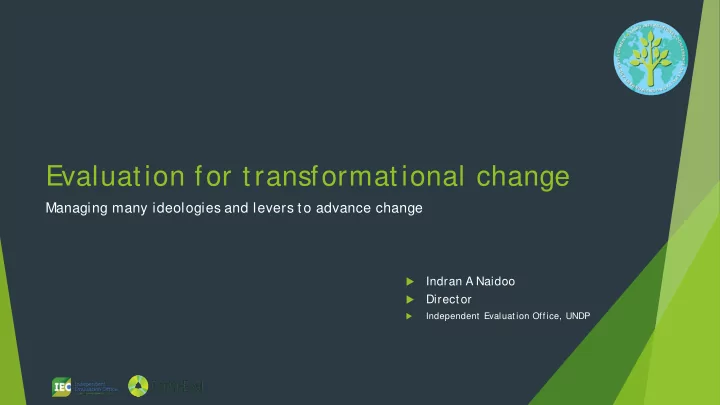

Evaluation for transformational change Managing many ideologies and levers to advance change Indran A Naidoo Director Independent Evaluation Office, UNDP
Why is Evaluation NOT about eventual j udgment and so status quo… Cannot assume that evaluation is about effecting change or being transformational Vested interests has defined evaluation away from its construct as j udgmental, independent – lets focus on learning and not “ making a j udgment about past value for learning and accountability, for any critical dialogue that initiates or motivates change” Today, it has a plural identity: A t ool and ext ension of management – scient ific good news, t o j ust ify program cont inuance ..evaluat ion must j ust ify more funding and evaluat ion unit s must be loyal t o t he inst it ut ional direct ion Primarily being about learning Not needing t o make recommendat ions, but working in a collect ive and part icipat ory manner for j oint underst anding and learning 10/ 2/ 2019 2
The “ let us be relevant mantra” Much of evaluative pitch – even in international evaluation units – has not been transformative, either in topic or process The pitch towards utility – to whom, evaluand or governance bodies and stakeholder, Empowering, if ever, who benefits, and what does it mean in S DG era with promise of citizen centered Bolstering arguments through evaluation - the evaluand uses for perpetuation or j ustification The notion that independence comes from outsourcing work to external parties and this brings credibility is disputed Dominant discussions in evaluation networks may not reflect new practices in evaluation, greater activity now in the global south 10/ 2/ 2019 3
Explicitly – what is transformational evaluation Classic, full confidence in entrenched Independent, does not privilege leadership and decision-makers to act entrenched S Q, seeks broad solicitation on evaluative evidence, evaluation is a of views, views decision-makers as management tool (clientism) evaluand A serving the evaluand means learning The client is the citizen, the thrust is is emphasized – a utility focused normative, democratic, transparent, evaluation is quite different – largely accountable internal – limited external A serving the higher ideal – democratic accountability ethos, privilege marginal voices but Global thrust from citizens and Boards focus on voice of potential and actual for credible evaluation, question of beneficiaries – independence allows independence high on global agenda as space to solicit views and privilege it is an issue of credibility emphasizing diverse views 10/ 2/ 2019 4
Why independent evaluation counts Its credible, its trusted It has more space to move Fundamental difference between Independence connotes authority and evaluation that pitches internally authenticity, and get heard (clientism) and externally (democratic) Easy to j ustify entry point, has power to More time needed to j ustify exercise, resist pushback, less treats to excise who you report to, how credible are you sensitive points from powerful positions and voices The use of consultants for independence – a hangover of a bygone Build a professional cadre, operating era shows buying services does not within policy and norms and standards, guarantee independence, the south fundamental shift now in evaluation have moved to build its own capacity models, from contract to conduct 10/ 2/ 2019 5
What we learnt from Independent Country program evaluations at UNDP Appreciated that independent evaluations are conducted and feedback provided for information, accountability, course correction and learning – the ICPEs feed into next program cycle and has direct utility Created external accountability due to management responses with commitments being in globally accessible evaluation reports One can draw themes and recurrences, with critical mass of work – 35 countries per annum, indicating where the impacts are 10/ 2/ 2019 6
Importance of evaluation process We build communication bridges through evaluation It is critical that evaluation engages with purported beneficiaries, and captures perspective of the historically marginalized Transparency in sharing preliminary findings and conclusions is vital – irrespective of whether it is sanctioned or not Independence gives access into the space of the evaluand and other stakeholders, and providing feedback to them is also possible due to independent stance 10/ 2/ 2019 7
Let us reflect on evaluations in our agencies – have they met the transformational standards Returning to the question of being” Independent in topic decision, approach, If we see evaluation as transformative, this process? requires and evaluative orientation that is robust and independent Effected change by challenging rather than validating? Evaluation is not meant to validate the S ought to bring about a more reflective and evaluand, but show performance, this means moving from clientism and utility emphasis to democratic climate, by encouraging the critical normative, democratic and transformational and reflective rather than marginalizing Advanced transparency by sharing critical pieces that give voice to the traditionally marginalized? 10/ 2/ 2019 8
Recommend
More recommend